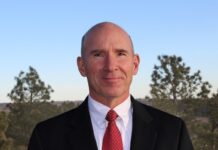
While acknowledging the plusses to human life existing in the Southwestern United States, the first two episodes broadly fall in line with NPR products on water shortages; colorfully produced, left-wing activism; in this case, Malthusian-Ecology.
The Colorado River basin, Lake Powell, Lake Mead, and the Hoover Dam have a Powell obstruction and a big dam problem: water shortages. By most of the data, long-term water supplies in Colorado, and the surrounding states are low.
And Colorado Public Radio—who share effectively the same philosophy as NPR—is talking about it.
Ecology Usually Portrayed as Front Line in a War Zone
Often when there is a crisis involving water or anything in nature (natural disasters, extreme weather, earthquakes, etc.), modern environmentalists blame human consumption and human use of the natural environment. Many people with worldviews identical (or nearly so) to modern environmentalists work in the twentieth-century-era news media. As such, to see the media launch directly into a Brothers Grimm-style gothic environmentalist narrative before the dust settles is normal: something bad happens outside, it’s because of humans and their pollution.
Whether or not a regional utility scare is spot-welded directly to man-made climate change, long-term water shortages and supplies are a problem for Colorado. It’s a problem for the state, other states, and those who rely on the Colorado River. From NPR to Breitbart News to National Review to the Washington Post, all political persuasions affirm the urgency. Even the White House recently issued a statement about this regional body of water. This type of consensus is extremely rare.
This agreement is big because the media scare of a climate-change-from-weather palindrome is often mostly political, cultural, or moral preening—usually a mix. After some bluster, the news cycle moves on. Renewable energy continues to get billions in subsidies, environmentalist groups continue to browbeat institutions into giving them increasingly more influence, and fossil fuels quietly support the free world in the background while being blamed for the whole thing.
This time it’s bigger than that.
And one item in this information eco-system comes from Colorado Public Radio. “Parched” is a new podcast hosted by Michael Elizabeth Sakas, a climate and environment reporter for CPR News.
With some surprising efforts at a genuine attempt to solve the water problem, Colorado Public Radio’s new series on the Colorado River water shortage generally follows the usual news-media and modern environmentalist narrative. At least, that is, in its first two episodes.
Dry Years: It’s Agreed that Tens of Millions, Even Trillions of Gallons are Missing
While “Parched” starts with a narrative assigned, it does bring attention to the water problem. Others have noted the objective metrics involved.
The Colorado River Compact was confirmed in 1922. From surveying and data at the time, an estimated 18 million acre-feet (MAF) or 5.87 trillion gallons would flow through the river every year. Colorado, Wyoming, New Mexico, Utah, Arizona, Nevada, and California would divvy it up.
In 2022, the Colorado River basin saw only 9.9 MAF or 3.22 trillion gallons, according to the Water Education Forum cited in National Review. The same WEF report also noted that only four years since 1991 have seen that same high water mark as 1922 regarding water supplies.
‘Parched’ Sets a Narrative, in Flowery Production and Audio
Vaguely informative but well-produced infotainment is public radio’s specialty. Yet, as any veteran media consumer knows, there is always a detectable shark fin of hard-left ideology swimming about in anything created or even loosely affiliated with NPR. It’s not hard to see. “Parched” has an interesting audio-craft but also that lurking leftism.
The first episode of “Parched” includes flowery narration. The producer, Sakas, and another CPR staff member drive into a wintery Rocky Mountain landscape to see the Colorado River. They trudge through the snow. One of them eats some of it.
Later in the episode, the reporter and podcast host Michael Elizabeth Sakas talks to Colby Pellegrino, a Deputy General Manager for Resources at the Southern Nevada Water Authority. Sakas asks Pellegrino a less-than-scientific question, “You have two kids. How much do you think about them when it comes to your work?” They’re on Saddle Island, a now-exposed rock formation due to receding water levels. The context is urgency.
Sakas also talks to someone visiting the Hoover Dam. The visitor is with her brother and her niece. The visitor remembers seeing the high levels of water when she was younger. Her niece is seeing the levels today, Sakas asks, “How does that make you feel knowing that she hasn’t seen that and might never see that?”
Peppered in is climate change narrativizing. When visiting the Hoover Dam and talking to the tourist, Sakas notes, “We’re both sweltering, even though it’s October.” In the winter jaunt, she notes how the snow is dry, and the Colorado River is not flowing very heartily beneath the thin ice.
If there’s any doubt about the podcast’s purpose, it’s in the promotion. “We hope to galvanize people living in the West to bring about solutions and force action before it’s too late.”
Additionally, NPR, being part of the American Left, is very fond of experts. For NPR, this is especially true for climate change. They want experts who know “the science.” And people without advanced degrees are never allowed to speak about environmentalism—unless they agree with the environmentalists. As such, Sakas’ being selected for this podcast looks somewhat inconsistent. Though she’s done newsroom and news coverage, Sakas’ CPR bio does not list any earth sciences background or experience in those fields before her current position.
Church and State Solution to the Water Crisis?
In episode two, Sakas talks to someone who’s comfortable framing policy advice from a religious perspective. That person doesn’t appear to have a college degree or a science background either. Ordinarily a bright-red flag for expertise-minded NPR. They do have water management experience. But they also want to share some points about their religious roots that they appear to want lawmakers, farmers, citizens, and others to consider.
That person with the policy perspective, Daryl Vigil (“vee-yeel”), does have over a decade of experience in water management. He sits on multiple First Nations affairs councils and water management trusts. His efforts to have First Nation’s people get more seats at the table in decision-making about the Colorado River are historically significant.
But Colorado Public Radio is very comfortable with Vigil—a water supplies resource manager seeking to influence public policy—sharing his religious views on the river. This religious allusion isn’t a simple line about mother earth; it’s a common motif throughout the remarks that “Parched” chose to share. The Indigenous Affairs Reporter, Taylar Dawn Stagner, interviewed Vigil.
“That’s the level of reverence you give that stream or that river because our ancestors go back into that and they come from that as well. And then inside the kivas [ceremonial buildings within the larger Pueblo culture], as, you know, taking part in ceremony, the medicine men and the spiritual people, uh, at every occasion making medicine, water and, and, and blessing the water and, and blessing the community through the water.” – Daryl Vigil | Co-Director, Water & Tribes in the Colorado River Basin – in Ep. 2 of Parched
Again, in case there’s any doubt about influencing politics with religion, Vigil is quoted in episode two: “What type of reverence and honor would you give something that’s of, of spiritual nature? How do you start to influence Western society’s thoughts about natural resources?”
Can we predict how public radio listeners might react to someone without a specialized degree, someone who works for a religious non-profit in Colorado Springs, giving their perspective on how to use natural resources?
Next Up: Piping in Water from the Mighty Mississippi Plus, Are Southern California and the Pacific Ocean Worth Their Salt?
Episode three deals with the prospect of piping water from the Mississippi or the Missouri River into the southwestern United States. Number four takes a slanted look at California’s—the state that guzzles from the Colorado River—efforts at desalination. It might not work since “a study published in 2019” (that’s the full citation in the episode) and “some studies” (same episode) throw shade on desalination. Check back with The Maverick Observer for more of our coverage on Colorado’s historic water involvement.










So the writer’s beef with this podcast is that it’s too slickly produced, has too many experts, has not enough experts, includes native american perspective, includes mention of the aridification of the american west, and….? Seems like this all boils down to an original sin of affiliation with NPR. A lazy attempt to apply anti-liberal bias to perspectives on a truly non-partisan issue.
What is this article about besides a rant on an opposing view?